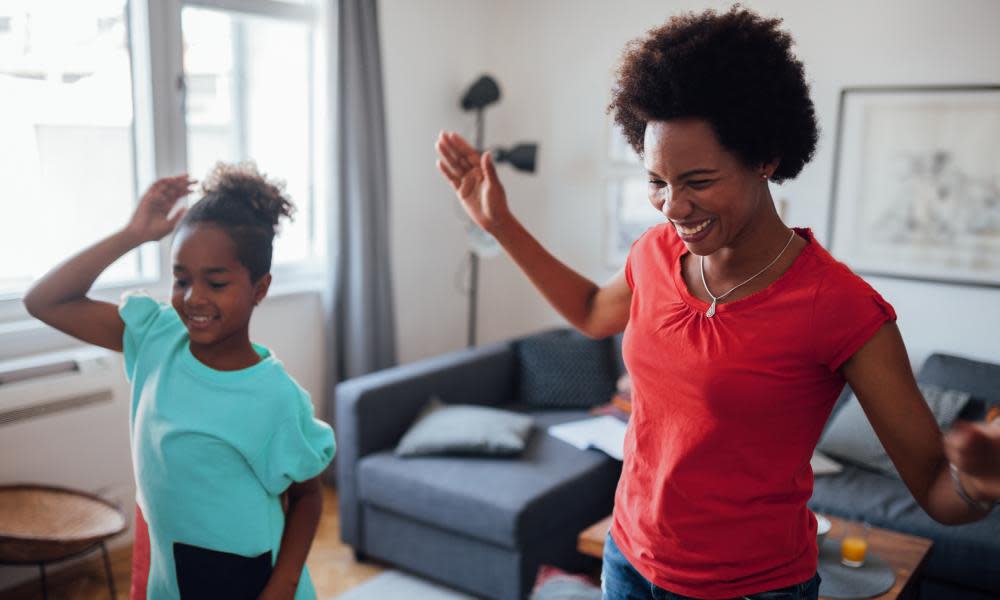‘Shared screen time can help’: five unexpected ways to really connect with your kids

Whatever you had planned for 2020, becoming a home schooling, child-entertaining multitasker and/or teen whisperer probably wasn’t it. But, as we’ve all wrestled with the new normal, one good thing that’s come out of lockdown is a more intimate connection with our children – one recent survey by childcare.co.uk revealed 72% of UK families feel lockdown has brought them closer. So how should we nurture and grow these bonds?
Annabel Rosenhead, a psychotherapist who’s co-authored Happy Confident Me with parenting coach Nadim Saad, reveals five simple but effective ways to keep connecting:
1. Talk frankly
From teachers wearing masks at school to cancelled holidays, coming out of lockdown can mean tricky conversations and how you approach these topics can make all the difference. Rosenhead explains: “Our children – whatever age they are – are our mirrors. So, before you talk to them, check in with yourself. ‘Am I stressed? Overwhelmed? Anxious?’ and address what you need, even if it’s just five minutes in a room by yourself. Because it’s not what you’re saying but how you’re saying it that’s important.
“Then, think about what you’re going to tell your children (don’t just blunder in) and get on the same level as them – difficult conversations are often best had when you’re doing something together, such as going for a walk or playing snap. With a four-year-old, it could be colouring in, while for teenagers it may be gaming together or cooking.”
2. Embrace shared screen time
According to an Ipsos Mori survey from April, shared viewing as a family is up 37% year-on-year. And it’s something to continue even now we’re free to go to the beach, visit friends and museums. “From dancing together, following routines you’ve found on TikTok, to gaming, shared screen time can really help families to boost connections,” says Rosenhead. “It used to feel like a child would bury themselves away in their room with a screen, but now you can share screens anywhere and you can choose together what you want. Even with small screens, it’s about finding out what children are interested in and exploring it together.”
3. Let them take over
“The way children have been really affected by the pandemic – from younger ones right the way through to young adults – is a lack of agency. As a child, you don’t have much control anyway but now that’s shrunk right down,” says Rosenhead. “Any sense of independence at school is no longer happening, which can also affect their self-esteem and mental wellbeing. So you need to counter this with connection, communication and giving them their agency back.
“For example, I’ve been going on daily bike rides with my 10-year-old daughter and I now let her cycle on the road, which I never would have done before lockdown. I let her choose the route, even when she’s got me riding all over the place; it’s giving them the opportunities to decide things.” So from navigating with your map app to picking items for online shopping or Googling holiday destinations for the future, let your kids take over some big decisions.
Related: ‘I found myself in charge of the kids’: did lockdown make me a better dad?
4. Rethink screen time
Catching up with friends and extended family over the phone, social media or video was named by 79% of people in a recent ONS survey as a key coping strategy in lockdown, especially for older kids. So how do you encourage fed-up teenagers into talking to their friends and grandparents? “Teenagers are social creatures and being isolated isn’t good for them, so this is a time when we do have to relax screen time rules,” says Rosenhead. “So long as they’re safe and actually talking to their friends and family then let them enjoy it in their own space.”
5. Do something brand new
Searching out recipes for sourdough starters, asking Alexa how to plant tomatoes, downloading Couch to 5K … hobbies have come into their own in lockdown. “Shared experiences are enormously bonding and learning together is a great leveller,” recommends Rosenhead. “Children and teenagers are so used to being told what to do but if you’re both out and about learning something new, you’re doing it as equals. These things give a sense of togetherness and will build memories.” So, yes, studying “How to pogo” videos in the park creates an important parent-child connection. “Hopefully, this time together will be one of the good things our children will take with them into the future,” says Rosenhead.
From helping your kids stay connected with their friends to sharing time together as they acquaint you with the intricacies of TikTok, getting the most from your mobile data has never been more important.
Keep connecting with our unlimited data plans. Switch to unlimited today from £22pm on the UK’s best mobile data network. Switch now

 Yahoo News
Yahoo News 
